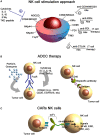Immunological and Translational Aspects of NK Cell-Based Antitumor Immunotherapies
- PMID: 27891129
- PMCID: PMC5104957
- DOI: 10.3389/fimmu.2016.00492
Immunological and Translational Aspects of NK Cell-Based Antitumor Immunotherapies
Abstract
Natural killer (NK) cells play a pivotal role in the first line of defense against cancer. NK cells that are deficient in CD3 and a clonal T cell receptor (TCR) can be subdivided into two major subtypes, CD56dimCD16+ cytotoxic and CD56brightCD16- immunoregulatory NK cells. Cytotoxic NK cells not only directly kill tumor cells without previous stimulation by cytotoxic effector molecules, such as perforin and granzymes or via death receptor interactions, but also act as regulatory cells for the immune system by secreting cytokines and chemokines. The aim of this review is to highlight therapeutic strategies utilizing autologous and allogenic NK cells, combinations of NK cells with monoclonal antibodies to induce antibody-dependent cellular cytotoxicity, or immune checkpoint inhibitors. Additionally, we discuss the use of chimeric antigen receptor-engineered NK cells in cancer immunotherapy.
Keywords: antibody-dependent cellular cytotoxicity; checkpoint inhibitors; chimeric antigen receptor; immunotherapy; monoclonal antibody; natural killer cell.
Figures

References
Publication types
LinkOut - more resources
Full Text Sources
Other Literature Sources
Research Materials

